Thanks for joining us again as we continue our week-long blog series on why it is ESSENTIAL that we start talking about colon cancer before the age of 50. On Monday, we learned about Karen Walsh, a passionate advocate for colon cancer prevention and awareness. Karen is currently battling stage IV colon cancer and, in her keynote address at the National Colorectal Cancer Roundtable, asked why she (and so many fighters like her) had never been told the symptoms of colon cancer or that knowing your family history is important because it could effect the age at which you should be screened. (Hint: For many people, it must be earlier!) Tuesday, we talked about symptoms, risks, and family history. Yesterday, we called on the medical and colon cancer community to start the conversation long before a patient turns 50.
Yesterday, we also alluded to a staff member who lost her dad to colon cancer in 2016. This is her story.
In August of 2016, my dad died at the age of 58 from complications arising from his colon cancer after a battle that spanned more than four difficult years.
Dad was diagnosed at the age of 54 in May of 2012, a mere three months before my wedding. He pushed through chemotherapy and radiation that summer, danced at my wedding, and then underwent a major surgery in September, including a partial colectomy. After another round of chemotherapy, he was declared cancer free.
His cancer returned three more times, requiring more radical surgeries and treatments.
My dad fought valiantly every single day of those four years. Even when the side effects were rough, or his prognosis wasn’t great; even when the metastasized tumors compressed his spine and limited the use of his legs; even when he was stuck in the hospital, he fought hard, with humor, grace, and hope.
My dad was a passionate advocate who found a voice in encouraging those around him to become their own best health advocates. “Learn as much as you can,” he would say. “Don’t settle. Ask lots of questions. If something doesn’t feel normal, speak up and don’t stop until someone listens to you!” He believed knowledge is power – and so it is.
It’s true when they say that cancer is a family illness. Sure, my dad had the chemo port and, as he liked to joke, had been the one “gutted like a fish” by his surgeon, but we were with him. We watched. We supported. We hoped and prayed. We feared. And, in the end, we grieved.
Life was bleak last August. September wasn’t much better as we, the family, who had fought alongside him for so long, tried to figure out just what we were going to do with ourselves.
He had been nagging my sister and me for months to get a colonoscopy. He wanted to make sure that neither of us ever had to suffer what he had. Dad knew that colon cancer is preventable and he wanted his daughters to be screened.
Finally, at the end of September, I decided to go. I called multiple general surgeons in town, all of whom told me that I would have to pay out of pocket for my colonoscopy because I wasn’t yet at the American Cancer Society’s “recommended screening age.” To break that down, my dad was diagnosed at 54, so I wasn’t “eligible” for screening until 44 – ten years before my dad’s diagnosis. I was 29 at the time.
I remembered what my dad always said about advocating for yourself. I didn’t take “No” for an answer. I finally found a gastroenterologist who said that I absolutely needed to be screened. Nearly two months after my dad’s death, I went in for my first colonoscopy.
They removed two precancerous polyps.
Our founder, Dr. Whitney Jones, calls people like me “Previvors,” which means that we are people who knew our family history or risks, got screened, and prevented colon cancer. My GI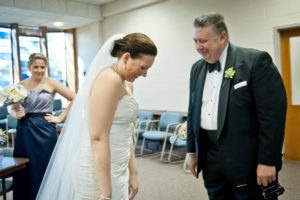 doctor tells me that, had I waited until the recommended age for me – 44 – I likely would have had later stage colon cancer. In the end, my insurance covered the colonoscopy.
doctor tells me that, had I waited until the recommended age for me – 44 – I likely would have had later stage colon cancer. In the end, my insurance covered the colonoscopy.
That was a sobering day. I felt as if I’d dodged a bullet in a very real way. I was shaken but so relieved and felt like my dad would have been really proud of me. Given the findings of my colonoscopy, I am now on a schedule to receive a surveillance colonoscopy every three years. In addition, my children will need to be screened for polyps ten years before my first polyp was removed, meaning that, at 19, my children will receive colonoscopies.
My dad was right – knowledge is power. Consider, if you will, the implications of my screening. Not only have I prevented colon cancer for myself, but I have potentially prevented it for my children and grandchildren, too. Dad would be proud of that legacy, proud to know that his battle led to something good in the end, that his family would not have to suffer the same hard road.
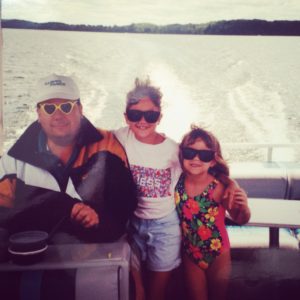 When we talk about the importance of knowing your family history, this is why it matters so much. My paternal grandmother died of colon cancer in her 40s. My father died in his 50s of colon cancer. I knew this and, even though it meant pushing back against current standards, I demanded to be screened, which saved my life. It can’t change the present, but if my dad had known to start colon cancer screenings in his 40s (or earlier), he would probably still be with us. My children will know their family history of colon cancer and, at a very early age, be on track to prevent it by having timely screenings.
When we talk about the importance of knowing your family history, this is why it matters so much. My paternal grandmother died of colon cancer in her 40s. My father died in his 50s of colon cancer. I knew this and, even though it meant pushing back against current standards, I demanded to be screened, which saved my life. It can’t change the present, but if my dad had known to start colon cancer screenings in his 40s (or earlier), he would probably still be with us. My children will know their family history of colon cancer and, at a very early age, be on track to prevent it by having timely screenings.
I can’t emphasize this enough – on-time screenings save lives.
My work at the Colon Cancer Prevention Project has been immensely challenging emotionally, but also incredibly rewarding. My dad’s legacy carries on. His words and passion for advocacy live with me and in my work.
The lessons of my dad’s and my shared stories are simple:
- Know your family history of cancer, polyps, or bowel disease (even if this means having uncomfortable conversations with your family)
- Know your risk factors and risk behaviors
- Get screened
- Advocate for yourself. Advocate for yourself. Advocate for yourself.
Knowing what I know now and being on a screening schedule, I’m hopeful that I will always remain a “Previvor” and never have to fight for Survivor status. I’m hopeful that, if we can change current policy and standards, we can prevent everyone from ever being diagnosed with colon cancer. We can prevent loss, death, and suffering. We can save lives.
But to save lives, we need to make some major institutional changes. 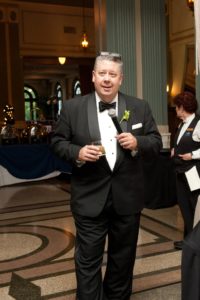
We’ve been hinting at it all week but tomorrow we take action. We are proposing a radical change in how we talk about colon cancer – particularly when we talk about colon cancer. 50 is too late to begin the conversation.
Even if 50 is the appropriate screening age for you, how will you know unless you’ve been considering it sooner? Without knowing your family history, how could you possibly know what your appropriate screening age is? Also, do we need to rethink the guidelines for screening completely, given the overwhelming evidence that points to astronomical rise in colon cancer diagnoses in people under 50?
We think so. We hope you’ll join us tomorrow as we take action, try to effect positive change, and advocate to save lives. We can do this if we do it together. My dad always encouraged people to “find their team,” a firm believer in the power of passionate people working together.
There’s a Native American proverb which says, “It takes a thousand voices to tell a single story.” Join our team and be one of those voices calling out for change. Our stories are powerful and our passion is immense – let’s use them to save lives. Together.
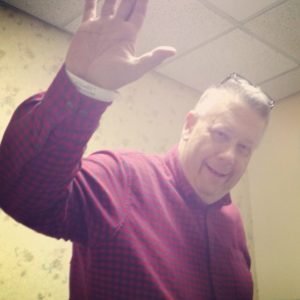
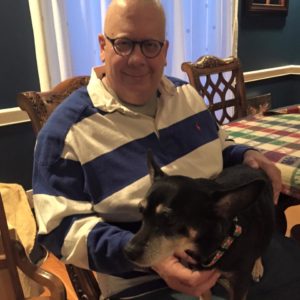
You must be logged in to post a comment.